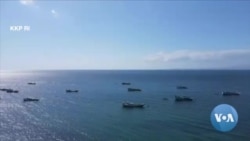ບັນດາປະເທດໃນເຂດເອເຊຍຕາເວັນອອກສຽງໃຕ້ ໄດ້ຮັກສາຄວາມດຸ່ນດ່ຽງທີ່ບອບບາງ ລະຫວ່າງການຕໍ່ຕ້ານການອ້າງກຳມະສິດ ທີ່ກວ້າງຂວາງຂອງຈີນ ໃນທະເລຈີນໃຕ້ ແລະຂະນະດຽວກັນ ກໍຮັກສາສາຍພົວພັນທາງການຄ້າທີ່ດີ ມາເປັນເວລາດົນນານ. ແຕ່ກໍມີຫລາຍປະເທດ, ລວມທັງອິນໂດເນເຊຍ, ເຊິ່ງໃນຂະນະນີ້ ໄດ້ຢືນຢັດຢ່າງໜັກແໜ້ນຕໍ່ຕ້ານການກ່າວອ້າງເອົາກຳມະສິດດັ່ງກ່າວ. ອາຮາດຽນ ອູທາມາ ຜູ້ສື່ຂ່າວວີໂອເອ ມີລາຍງານກ່ຽວກັບເລື້ອງນີ້ຈາກຈາກາ ເຊິ່ງອາດນະສັກ ມີລາຍລະອຽດມາສະເໜີທ່ານ ໃນອັນດັບຕໍ່ໄປ.
ອິນໂດເນເຊຍໄດ້ອະນຸມັດແຜນການເບື້ອງຕົ້ນໃນການພັດທະນາແຫຼ່ງອາຍແກັສ ທູນາ ບລ໊ອກ ທີ່ຕັ້ງຢູ່ໃນເຂດນ່ານນ້ຳ ນອກໝູ່ເກາະ ນາທູນາ ຂອງຕົນ.
ມັນເປັນພື້ນທີ່ດຽວກັນກັບການຂຸດເຈາະ ໃນທ້າຍປີ 2021 ທີ່ພາໃຫ້ເກີດການປະທ້ວງຈາກຈີນ. ຈາກາຕາໄດ້ຢຸດການສຳຫຼວດໃນເວລານັ້ນ, ແຕ່ ມັນບໍ່ໄດ້ຍົກເລີກ ໃນຂະນະນີ້.
ທ່ານອາລ ອາຣາຟ, ອາຈານສອນຢູ່ມະຫາວິທະຍາໄລ ພາຣາມາດີນາ (Paramadina) ກ່າວວ່າ "ການຂຸດເຈາະອາຍແກັສໃນເຂດ ນາທູນາ ໂດຍອິນໂດເນເຊຍ ແມ່ນສັນຍານທີ່ຊັດເຈນວ່າ ນາທູນາ ແມ່ນອານາເຂດຂອງອິນໂດເນເຊຍ ... ໃນຄວາມຄິດເຫັນຂອງຂ້ອຍ, ອິນໂດເນເຊຍ ເປັນປະເທດທີ່ມີອະທິປະໄຕ ມີສິດທີ່ຈະເຮັດສິ່ງນີ້."
ໝູ່ເກາະ ນາທູນາ, ເຊິ່ງຕັ້ງຢູ່ນອກຝັ່ງທະເລ ບໍນຽວ ຂອງອິນໂດເນເຊຍ, ແມ່ນດິນແດນຂອງອິນໂດເນເຊຍ. ແຕ່ນ່ານນໍ້າທີ່ຫ່າງອອກໄປ ປະມານ 200 ໄມລ໌, ບ່ອນທີ່ ທູນາ ບລ໊ອກ ຕັ້ງຢູ່ ໃນທະເລ ນາທູນາເຫນືອ, ແມ່ນແຫຼ່ງຂອງຄວາມຂັດແຍ້ງ.
ອິນໂດເນເຊຍ ຖືວ່າ ມັນຍັງເປັນສ່ວນໜຶ່ງຂອງເຂດເສດຖະກິດຈຳເພາະຂອງຕົນ, ໂດຍອີງຕາມສົນທິສັນຍາຂອງສະຫະປະຊາຊາດກ່ຽວກັບກົດໝາຍວ່າດ້ວຍທະເລ ຫຼື UNCLOS.
ແຕ່ຈີນ ລວມເອົາມັນ ເຂົ້າໃນການອ້າງກຳມະສິດ ເອົາດິນແດນ ອັນກວ້າງຂວາງຂອງຕົນໃນທະເລຈີນໃຕ້, ການອ້າງກຳມະສິດ ໄດ້ຖືກປະຕິເສດເປັນສ່ວນໃຫຍ່ ໂດຍສານຕັດສິນຊີ້ຂາດຖາວອນ ທີ່ນະຄອນເຮກ ໃນປີ 2016.
ທ່ານ ທືກູ ຟາຍຊາເສຍ (Teuku Faizasyah), ໂຄສົກກະຊວງການຕ່າງປະເທດ ຂອງອິນໂດເນເຊຍ ກ່າວວ່າ "ກ່ຽວກັບການເຄື່ອນໄຫວຂອງອິນໂດເນເຊຍ ໃນເຂດທະເລແຫ່ງຊາດຂອງຕົນ, ເຊິ່ງອີງໃສ່ກົດໝາຍທາງທະເລສາກົນ, ແລະ ຈຸດຢືນຂອງອິນໂດເນເຊຍ ແມ່ນພວກເຮົາບໍ່ມີຄວາມຂັດແຍ້ງ ກັບປະເທດໃດກໍ່ຕາມ ທີ່ອ້າງກຳມະສິດຕໍ່ດິນແດນ ເຂດທະເລຈີນໃຕ້."
ການສຳຫຼວດອາຍແກັສຄືນໃໝ່ ສາມາດເຫັນໄດ້ວ່າ ເປັນການເພີ່ມທະວີຄວາມເຄັ່ງຕຶງ ລະຫວ່າງປະເທດທີ່ໃຫຍ່ທີ່ສຸດຂອງເອເຊຍຕາເວັນອອກສຽງໃຕ້ກັບຈີນ.
ໃນເດືອນທັນວາຜ່ານມາ, ຄວາມເຄັ່ງຕຶງໄດ້ເພີ່ມຂຶ້ນ ເມື່ອອິນໂດເນເຊຍ ແລະ ຫວຽດນາມ ໄດ້ສຳເລັດການກຳນົດເຂດແດນ ຂອງເຂດເສດຖະກິດຈໍາເພາະ, ເຮັດໃຫ້ປັກກິ່ງສົ່ງໜ່ວຍຍາມຝັ່ງຂອງຕົນ ເຂົ້າໄປໃກ້ກັບເຂດທູນາ ບລ໊ອກ ແລະ ເຂດຂຸດຄົ້ນອາຍແກັສ ຈິມ ສາວ ຂອງຫວຽດນາມ.
ການເຄື່ອນໄຫວນັ້ນ ໄດ້ເຮັດໃຫ້ອິນໂດເນເຊຍ ສົ່ງກຳປັ່ນລົບໄປພາກເໜືອ ຂອງ ທະເລ ນາທູນາ.
ພົນເຮືອເອກ ມູແຮມມາດ ອາລີ (Muhammad Ali), ເສນາທິການກອງທັບເຮືອອິນໂດເນເຊຍ ໄດ້ກ່າວວ່າ "ຖ້າພວກເຂົາຈັບປາ ຫຼືດໍາເນີນການສຳຫຼວດ ຫຼືຂຸດຄົ້ນຊັບພະຍາກອນທາງທະເລ, ນັ້ນແມ່ນເປັນສິ່ງຕ້ອງຫ້າມ. ມັນຕ້ອງໄດ້ຮັບການອະນຸຍາດ ຈາກລັດຖະບານອິນໂດເນເຊຍ. ຖ້າພວກເຂົາພຽງແຕ່ເດີນທາງຜ່ານ, ແມ່ນອະນຸຍາດໄດ້"
ຂະນະນີ້ ກອງທັບເຮືອອິນໂດເນເຊຍ ໄດ້ນຳໃຊ້ກຳປັ່ນລົບ 5 ລຳ ແລະ ເຮືອບິນລາດຕະເວນ ຂອງກອງທັບເຮືອ ເພື່ອຕິດຕາມກວດກາ ຢູ່ທາງພາກເໜືອ ຂອງທະເລ ນາທູນາ, ເຊິ່ງຄືກັນກັບນ່ານນໍ້າຫຼາຍໆແຫ່ງ ໃນເຂດອິນໂດປາຊີຟິກ ທີ່ຍັງເຫັນກິດຈະກຳການຫາປາ ຈາກກຳປັ່ນຂອງຈີນ, ຕິດຕາມດ້ວຍໜ່ວຍຍາມຝັ່ງຂອງປະເທດດັ່ງກ່າວ.
ອ່ານຂ່າວເປັນພາສາອັງກິດເພີ້ມຢູ່ລຸ່ມນີ້:
The countries of Southeast Asia have long maintained a fragile balance between resisting China’s expansive claims in the South China Sea and maintaining good trade ties. But several, including Indonesia, are now standing firm in resisting those claims, as VOA’s Ahadian Utama reports from Jakarta.
Indonesia has approved an initial plan for the development of the Tuna Block gas field located in waters off its Natuna Islands.
It’s the same area where drilling in late 2021 led to a protest from China. Jakarta halted exploration then, but it isn’t backing down now.
Al Araf, Paramadina University Lecturer
"The gas drilling in the Natuna area by Indonesia is a clear sign that Natuna is Indonesian territory … in my opinion, Indonesia as a sovereign country has the right to do this.”
The Natuna Islands themselves, off the coast of Indonesia’s Borneo, are Indonesian territory. But the waters about 200 miles away, where the Tuna Block is situated in the North Natuna Sea, is a source of contention.
Indonesia considers it also part of its exclusive economic zone, based on the U.N. Convention on the Law of the Sea, or UNCLOS.
But China includes it in its expansive territorial claims in the South China Sea, claims largely rejected by the Permanent Court of Arbitration at the Hague in 2016.
Teuku Faizasyah, Ministry of Foreign Affairs Spokesperson
“Regarding Indonesia's activities in its national sea area, it’s based on the international maritime law, and Indonesia's position is that we do not have a dispute with any country that claims the South China Sea territory.”
The resumption of gas exploration could be seen as an escalation of tensions between Southeast Asia’s largest nation and China.
In December, tensions were already high when Indonesia and Vietnam finalized the boundaries of their exclusive economic zones, prompting Beijing to send its coast guard near the Tuna Block and Vietnam’s nearby Chim Sao gas field.
That move led Indonesia to send a warship to the North Natuna Sea.
Admiral Muhammad Ali, Indonesian Navy Chief of Staff
"If they catch fish or carry out exploration or exploitation of marine resources, that is prohibited. It must be licensed by the Indonesian government. If they are just passing by, that's allowed."
The Indonesian Navy has now deployed five warships and a naval patrol plane to monitor the North Natuna Sea,
which like many waters in the Indo Pacific, has also seen fishing activity from Chinese vessels, accompanied by the country’s coast guard.





